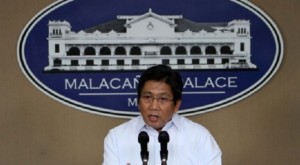Palace blames PH bad record of journalist killings on Maguindanao massacre
MANILA, Philippines – Malacañang may have found an excuse for the government’s poor record in cracking cases of journalists’ killings: the big number of journalists slain in the 2009 Maguindanao massacre.
Confronted with a survey listing the Philippines among top three countries where journalists’ murders go unpunished, Communications Secretary Herminio Coloma Jr. on Saturday traced the problem to the massacre.
Coloma said the basis for the latest Global Impunity Index released by the Committee to Protect Journalists (CPJ) was the high number of unsolved killings of journalists in the country.
“It’s easy to pinpoint why there’s a big number of unsolved crimes involving journalists. Because in just one case, the Maguindanao massacre, more than 50 persons lost their lives because of the impunity against journalists,” he said on state-run dzRB radio.
Coloma conceded that after three years of trial, the court has yet to hand down a judgment on the accused who number nearly 200.
Article continues after this advertisement“You know, there’s a big challenge because the trial has run for three years, yet it’s nowhere close to being resolved,” he said. “Even so, the government is determined to pursue the case, and seek resolution and justice for this.”
Article continues after this advertisementThirty-two journalists were among 58 persons killed on Nov. 23, 2009 allegedly by men of the Ampatuan clan which had then been ruling Maguindanao province for years.
Fresh violence and failure to prosecute old cases kept Iraq, Somalia and the Philippines in the three worst slots in the index, the CPJ said.
In the case of the Philippines, more than 50 journalist murders that took place from 2004 to 2013 remained unsolved, the group said.
Cases were considered “unsolved” if no convictions have been made.
Carlos Conde, the Philippines researcher for Human Rights Watch’s Asia division, weighed in on the issue of why the Philippines ranked the third most dangerous country for journalists after Iraq and Somalia.
“Although Filipino journalists do not face state censorship, reporters who take on sensitive topics such as government corruption and organized crime often risk deadly reprisals by local politicians with ‘private armies,’ corrupt police officers, and criminal syndicates,” he said in a statement earlier this week.
President Benigno Aquino III himself was asked how he was addressing journalists’ killings during his joint press conference with visiting US President Barack Obama in Malacañang last Monday.
Caught off guard, Aquino said the government’s track record spoke for itself, and cited the case of the Maguindanao massacre.
“The Maguindanao massacre involved something like 52 (sic) journalists. There are presently something like over a hundred people who are indicted for this crime and undergoing trial,” he told the Fox News White House correspondent Ed Henry.
“But that doesn’t mean we have stopped to look for others potentially involved in this particular killing,” he added.
Conde said Aquino’s initial reply—“Perhaps the track record speaks for itself’” — “compounded impressions of his government’s failure to address the problem.”
“That track record is poor, with arrests in only six of the journalist murder cases during Aquino’s time in office. In only two of those cases have the gunmen been convicted – but not the masterminds who ordered and paid for the murders,” he said.
On April 7, unidentified gunmen shot dead tabloid reporter Rubylita Garcia in Bacoor, Cavite.
Conde said that Aquino’s statement that investigations were ongoing and that the killings were an offshoot of “other issues” “dodges the inconvenient truth” that police have failed to fully investigate the majority of these cases.
“Until President Aquino addresses his government’s glaring failure to hold these killers to account, journalists in the Philippines will continue to fear for their lives,” he said.
RELATED STORIES
PH among countries where journalists’ murders most likely to go unpunished
Killings of Filipino journalists unabated, says dean of Columbia University journalism school
